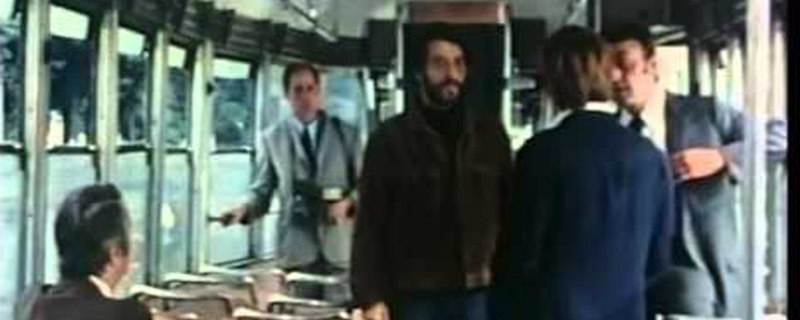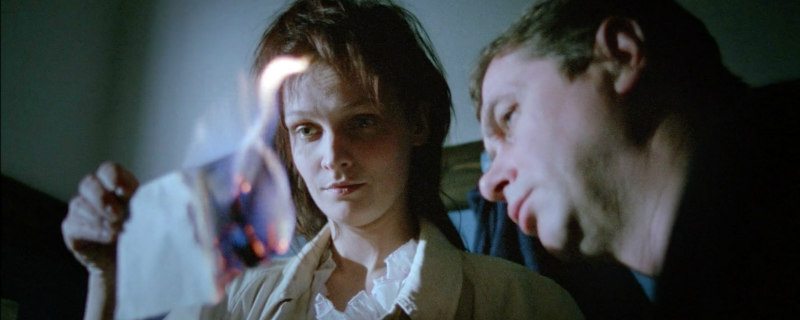
David Lynch was by no means the first master of cinema to leave his mark
on the small screen.
Words by
Eric Hillis
When Twin Peaks originally hit the air back in 1990, it was a
big deal, a network TV show in the hands of a filmmaker acclaimed for his
cinematic output. It's naive however to talk about TV in pre and post
Twin Peaks terms, as long before
David Lynch applied his vision to the gogglebox, a slew of
cinematic giants had produced great work for the small screen. Here we look
at 12 filmmakers who gave us memorable TV in the decades before the premiere
of Lynch's cult show.
Robert Altman

Dario Argento

John Badham

Ingmar Bergman

John Carpenter

Rainer Werner Fassbinder

Alfred Hitchcock

Tobe Hooper

Krzysztof Kieslowski

Michael Mann

Steven Spielberg

Orson Welles


Prior to becoming a figurehead of New American Cinema in the '70s, Altman
had spent most of the previous decade helming episodes of hit shows like
Alfred Hitchcock Presents, Combat! and Bonanza. When his big screen fortunes began flagging in the '80s, Altman
returned to the small screen, directing TV movies like
The Laundromat, Basements and The Caine Mutiny Court Martial. It was his 1988 HBO series Tanner '88 that saw Altman
exploit the potential of cable TV. The 11-episode series followed Altman
regular Michael Murphy as Jack Tanner, a politician attempting to
secure the Democratic nomination for the presidency. Shot and broadcast
during the real life run up to the Democratic nomination, the show saw
Altman work under incredibly tight deadlines, often delivering a final cut
to HBO mere hours before the show was due to hit the airwaves. The fake
documentary style of Tanner '88 was revolutionary for US TV
at the time, but its influence can be seen now in everything from
The Office to Parks and Recreation.

Known for his cinematic visuals and extreme violence, the Italian master
of terror seems wholly unsuited to working in TV, but in 1973 he oversaw a
four episode anthology series, Door into Darkness, for Italian TV. Under the pseudonym Sirio Bernadotte, Argento
wrote and directed the best of the quartet of suspense tales,
Il Tram, an inventive hour long Hitchcockian thriller in which a detective
attempts to figure out how a woman was murdered on a tram without any
other passengers witnessing the act. In 2005, Argento would return to the
small screen for the fun Italian TV movie
Do You Like Hitchcock? and two episodes of the anthology
Masters of Horror.

TV movies were all the rage in the '70s, and prior to his big screen
breakout with 1977's Saturday Night Fever, Badham directed some of the most distinctive movies intended for living
room viewing. Penned by TV writer extraordinaire Lane Slate, 1973's
Isn't it Shocking? is a brilliantly quirky thriller
following Alan Alda as a small town sheriff investigating a series
of murders of OAPs, all while enjoying some fabulous chemistry with
co-star Louise Lasser. A remake of French shocker
Diabolique, 1974's Reflections of Murder excellently updates
Clouzet's film to '70s America, with a trio of compelling performances
from Tuesday Weld, Sam Waterston and the under-rated
Joan Hackett. The same year Badham helmed The Gun, a critique of America's gun laws that follows the life of a firearm as
it's passed around various owners. In recent years, Badham has returned to
TV, with a run of eight episodes of Supernatural in
2016.

A giant of the screen, Bergman worked in the world of TV as much as
cinema. In 1957, the same year as his international hit
The Seventh Seal, the Swede made his first TV movie, Mr Sleeman is Coming, and would regularly return to the small screen in the following
decades. Though many global viewers experienced it as a condensed,
theatrically released feature, 1973's
Scenes from a Marriage was initially aired on Swedish TV as
a six-part miniseries. 1982's Fanny and Alexander was
originally conceived as a four-part TV series, and though it was released
theatrically in a shortened 188 minutes version, it was later aired on TV
in its 312 minutes entirety. Following Fanny and Alexander, Bergman would continue working exclusively in TV for the remainder of
his career.

Unaware of just what a hit 1978's Halloween was set to
become, Carpenter agreed to deliver a pair of movies for the small screen.
Someone's Watching Me! is a gripping De Palmaesque thriller
that cleverly twists the premise of Rear Window on its head.
The director may not be known for his female characters, but
Lauren Hutton's protagonist is a compellingly quirky presence here.
The next year saw the director pay tribute to one of his musical heroes
with Elvis: The Movie, an enjoyable biopic anchored by a star turn from Kurt Russell,
who would enjoy many a fruitful collaboration with Carpenter in the
following decade. Carpenter returned to TV for the 1993 anthology
Body Bags and a pair of episodes for 2005's
Masters of Horror series.

Few filmmakers were as prolific as the German wunderkind. While pumping
out an average of two movies a year over the course of his brief career,
Fassbinder also worked heavily in German TV, directing no less than 14 TV
movies and two series. Despite the restrictions of the small screen,
Fassbinder never compromised his trademark style in his TV films, which
are largely indistinguishable visually from his theatrical features. The
most acclaimed of his TV movies is the prophetic 1973 sci-fi drama
World on a Wire, while his 14 episode 1980 series Berlin Alexanderplatz is
regarded as one of the small screen's finest ever achievements.

Though his work stands for itself, the reason Hitchcock is cinema's most
recognisable filmmaker is largely down to his weekly appearances in living
rooms introducing his Alfred Hitchcock Presents series,
which began in 1955 and ran for 10 seasons. Along with such high profile
guest directors as Robert Altman, Ida Lupino and
William Friedkin, Hitchcock directed 17 episodes of the show
himself, most memorably the 1958 installment
Lamb to the Slaughter, which starred Barbara Bel Geddes as a killer who gives new
meaning to the phrase 'meat is murder'. Hitch also directed episodes of
anthology shows Suspicion and Startime.

The director of the controversial
Texas Chain Saw Massacre may not seem the most suitable
filmmaker to work within the confines of American network TV, but in the
winter of 1979 Hooper terrified small screen audiences with his
unforgettable adaptation of Stephen King's Salem's Lot. Playing over two nights, Hooper's mini-series captured the essence of
King in a way so many other filmmakers have failed to in the decades
since, successfully transferring the very European vampire mythos to a
modern small town American milieu. Thanks to the terror generated by
Hooper, a generation of kids would never sleep with their windows open
again.

The Polish filmmaker had made TV movies earlier in his career, but it
was his 1989 series Dekalog that, a year before the debut
of Twin Peaks, would make film critics sit up and begin to take notice of the
potential for arthouse auteurs to create great work on the small screen.
Over 10 hour long episodes, Kieslowski explored each of the biblical ten
commandments as they affect the lives of a disparate group of Poles on a
large housing estate. Initially difficult to see outside of its native
Poland (international audiences will be more familiar with the two
episodes expanded for theatrical release,
A Short Film About Killing and
A Short Film About Love) the series now regularly tops critics' lists of the greatest ever TV
shows.

He may be considered a cinematic force today, but back in the '80s Mann
was known best as one of the forces behind the ephemeral cop show
Miami Vice, which reflected and inspired the decade's fashion, and incorporated
popular music in a way no show had done before. At the time, the show was
largely dismissed as little more than trashy fun, with TV commentators
overlooking how it introduced cinematic techniques like montage and
handheld camerawork to the small screen, influencing more highly regarded
cop shows of the '90s like Homicide: Life on the Street and
NYPD Blue. Mann also gave us one of the '80s best TV movies in
LA Takedown, a taut cops and robbers thriller that he would later remake for the big
screen as the acclaimed Heat.

As a young prodigy under contract at Universal, Spielberg kicked off his
career by directing a variety of TV shows, including a memorable
Columbo episode. It was his 1971 TV movie
Duel that gave the director the chance to show the world the
master filmmaker he would soon become, a tense man vs motor road thriller
that's as cinematic as anything in his filmography, so much so that the
film played in cinemas in Europe. Also recommended is his 1972 small
screen shocker Something Evil, a haunted house tale that plays like a dry run for
Poltergeist a decade later.

The ultimate renaissance man, by his mid-twenties Welles had mastered the
stage, radio and cinema, but it took a while before he would begin to
dabble in TV, mostly in front of the camera, exploiting his unique
presence as a presenter. In 1968, with Welles finding big screen
opportunities increasingly harder to come by, the director was offered the
chance to helm an hour long movie for French TV. The result was
The Immortal Story, in which Welles also starred alongside Jeanne Moreau, a
postmodern tale of an aging millionaire's attempts to recreate a story he
once heard. The first colour feature from Welles,
The Immortal Story was released in cinemas across
Europe.
